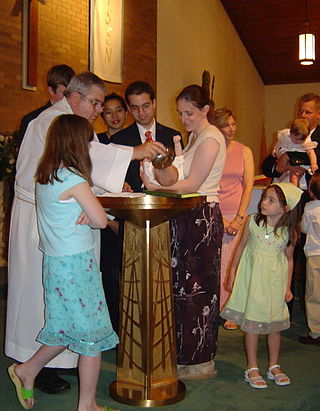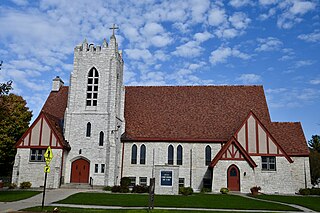
Baptism is a Christian sacrament of initiation almost invariably with the use of water. It may be performed by sprinkling or pouring water on the head, or by immersing in water either partially or completely, traditionally three times, once for each person of the Trinity. The synoptic gospels recount that John the Baptist baptised Jesus. Baptism is considered a sacrament in most churches, and as an ordinance in others. Baptism according to the Trinitarian formula, which is done in most mainstream Christian denominations, is seen as being a basis for Christian ecumenism, the concept of unity amongst Christians. Baptism is also called christening, although some reserve the word "christening" for the baptism of infants. In certain Christian denominations, such as the Catholic Churches, Eastern Orthodox Churches, Oriental Orthodox Churches, Assyrian Church of the East, and Lutheran Churches, baptism is the door to church membership, with candidates taking baptismal vows. It has also given its name to the Baptist churches and denominations.

The Eucharist, also called Holy Communion, the Blessed Sacrament or the Lord's Supper, is a Christian rite, considered a sacrament in most churches and an ordinance in others. Christians believe that the rite was instituted by Jesus at the Last Supper, the night before his crucifixion, giving his disciples bread and wine. Passages in the New Testament state that he commanded them to "do this in memory of me" while referring to the bread as "my body" and the cup of wine as "the blood of my covenant, which is poured out for many". According to the synoptic Gospels, this was at a Passover meal.

Excommunication is an institutional act of religious censure used to deprive, suspend, or limit membership in a religious community or to restrict certain rights within it, in particular those of being in communion with other members of the congregation, and of receiving the sacraments.

Infant baptism is the practice of baptizing infants or young children. Infant baptism is also called christening by some faith traditions.

Seventh Day Baptists are Baptists who observe the Sabbath as the seventh day of the week, Saturday, as a holy day to God. They adopt a theology common to Baptists, profess the Bible as the only rule of faith and practice, perform the conscious baptism of believers by immersion, and organize their churches in a similarly congregational church government. They profess a statement of faith instituted on fundamental precepts of belief. Seventh Day Baptists rest on Saturday as a sign of obedience in a covenant relationship with God and not as a condition of salvation.

The Last Judgment is a concept found across the Abrahamic religions and the Frashokereti of Zoroastrianism.

The Westminster Confession of Faith, or simply the Westminster Confession, is a Reformed confession of faith. Drawn up by the 1646 Westminster Assembly as part of the Westminster Standards to be a confession of the Church of England, it became and remains the "subordinate standard" of doctrine in the Church of Scotland and has been influential within Presbyterian churches worldwide.

The Schwarzenau Brethren, the German Baptist Brethren, Dunkers, Dunkard Brethren, Tunkers, or sometimes simply called the German Baptists, are an Anabaptist group that dissented from Roman Catholic, Lutheran and Reformed European state churches during the 17th and 18th centuries. German Baptist Brethren emerged in some German-speaking states in western and southwestern parts of the Holy Roman Empire as a result of the Radical Pietist revival movement of the late 17th and early 18th centuries, where people began to read and study their Bibles on their own- rather than just being told what to believe and do.
The Congregational Holiness Church is a Holiness Pentecostal Christian denomination that was formed in 1921.

Imputed righteousness is a concept in Christian theology proposing that the "righteousness of Christ ... is imputed to [believers]—that is, treated as if it were theirs—through faith." It is on the basis of Jesus' righteousness that God accepts humans. This acceptance is also referred to as justification.

Eucharistic discipline is the term applied to the regulations and practices associated with an individual preparing for the reception of the Eucharist. Different Christian traditions require varying degrees of preparation, which may include a period of fasting, prayer, repentance, and confession.
Koinonia, communion, or fellowship in Christianity is the bond uniting Christians as individuals and groups with each other and with Jesus Christ. It refers to group cohesiveness among Christians.

Eucharistic theology is a branch of Christian theology which treats doctrines concerning the Holy Eucharist, also commonly known as the Lord's Supper and Holy Communion.
The Power of the Keys, also known as the Office of the Keys, is a responsibility given to St. Peter to usher in the Kingdom of God on the Day of Pentecost, and a responsibility given to the other apostles by Jesus, according to Matthew 16:19 and Matthew 18:18. It is understood as a responsibility to admit or exclude from church membership (excommunicate), to set church policy and teachings (dogma), to render binding interpretations of Sacred Scripture, and to bind and loose sins. The verb 'to loose' is used this way in John 20:23, Revelation 1:5 and by the Early Church Fathers.
Lutheranism is a major branch of Protestantism that identifies primarily with the theology of Martin Luther, the 16th-century German friar and reformer whose efforts to reform the theology and practices of the Catholic Church launched the Reformation in 1517. Lutheranism subsequently became the state religion of many parts of Northern Europe, starting with Prussia in 1525.
This is a glossary of terms used within the Catholic Church. Some terms used in everyday English have a different meaning in the context of the Catholic faith, including brother, confession, confirmation, exemption, faithful, father, ordinary, religious, sister, venerable, and vow.
Christian theology is the theology – the systematic study of the divine and religion – of Christian belief and practice. It concentrates primarily upon the texts of the Old Testament and of the New Testament, as well as on Christian tradition. Christian theologians use biblical exegesis, rational analysis and argument. Theologians may undertake the study of Christian theology for a variety of reasons, such as in order to:
In religion, a covenant is a formal alliance or agreement made by God with a religious community or with humanity in general. The concept, central to the Abrahamic religions, is derived from the biblical covenants, notably from the Abrahamic covenant. Christianity asserts that God made an additional covenant through Jesus Christ, called the "New Covenant".

Criticism of Protestantism covers critiques and questions raised about Protestantism, the Christian denominations which arose out of the Protestant Reformation. While critics may praise some aspects of Protestantism which are not unique to the various forms of Protestantism, Protestantism is faced with criticism mainly from the Catholic Church and the Eastern Orthodox Church, although Protestant denominations have also engaged in self-critique and criticized one another. According to both the Catholic Church and Eastern Orthodoxy, many major, foundational Protestant doctrines have been officially declared heretical.

Church membership, in Christianity, is the state of belonging to a local church congregation, which in most cases, simultaneously makes one a member of a Christian denomination and the universal Christian Church. Christian theologians have taught that church membership is commanded in the Bible. The process of becoming a church member varies based on the Christian denomination. Those preparing to become full members of a church are known variously as catechumens, candidates or probationers depending on the Christian denomination and the sacramental status of the individual.










